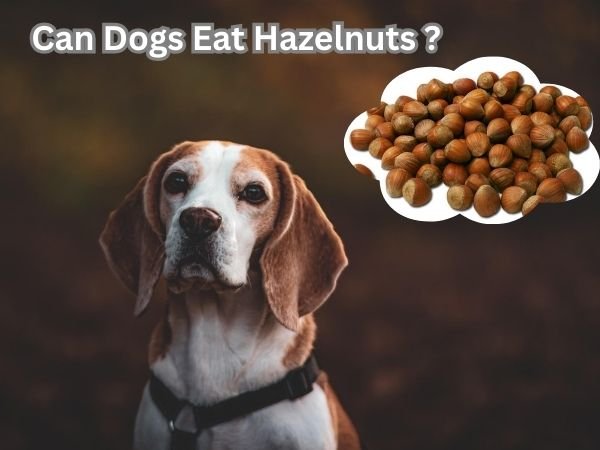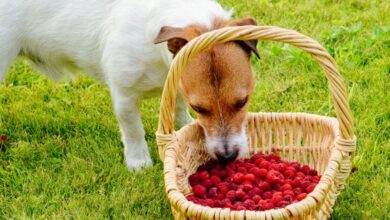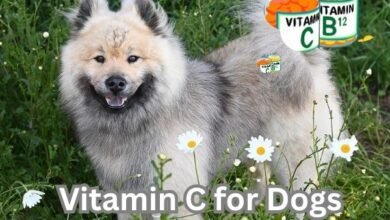
Can dogs eat hazelnuts? Hazelnuts are full of vitamins, antioxidants, fiber, and healthy fats. They are a nutritious snack for people and common in many diets. But are they safe for dogs or can dogs eat hazelnuts? Many pet owners are curious if this nut is okay to share with their pets.
Hazelnuts are not toxic to dogs, but they are not recommended. It is important to know the facts before giving hazelnuts to your dog.
If your dog eats a hazelnut from the floor, you may not need to worry, but there are important precautions to consider. This article explains five key warnings for dog owners about hazelnuts, based on guidance from veterinarians and pet experts. Review these points before giving hazelnuts to your dog.
What Are Hazelnuts?
Hazelnuts are small, round nuts that grow on hazel trees. People often snack on them or add them to things like chocolate spreads, baked treats, and granola bars. They are packed with healthy fats, vitamins, and minerals.
Can Dogs Eat Hazelnuts?
Sharing snacks with dogs might seem harmless, but dog and hazelnut safety is an important topic for pet owners. Plain hazelnuts are not toxic to dogs, meaning they do not contain chemicals that will poison your dog if eaten in small amounts.
Are Hazelnuts Safe for Dogs?
Hazelnuts are not toxic, but they are still not a good choice for dogs. Here is why:
- Dogs sometimes swallow hazelnuts without chewing, which can be a choking risk, especially for smaller breeds.
- Hazelnuts are tough for dogs to digest and could cause a blockage in their intestines.
- Hazelnuts have a lot of fat, which can upset your dog’s stomach and cause vomiting or diarrhea. In some cases, too much fat can even lead to a serious condition called pancreatitis.
- Flavored or salted hazelnuts are even riskier because the added ingredients can be unsafe for dogs.
Not every type of nut is safe for dogs. Plain hazelnuts are not as dangerous as some other nuts, but they still have risks and are best avoided. Macadamia nuts and black walnuts are actually toxic for dogs. Most nuts are high in fat, which can cause stomach problems and weight gain.
5 Vital Warnings for Owners
Hazelnuts are not safe for dogs. Dog owners should be aware of these five important warnings to help keep their pets safe.
1.Choking Hazards: What Pet Owners Need to Know
Hazelnuts may seem harmless, but their size and texture make them a choking hazard for dogs, especially small breeds.
Hazelnuts are small, round, and hard. Small dogs may try to eat them quickly and swallow them whole, which increases the risk of choking. Toy breeds and puppies are also at risk because they often put new objects in their mouths. Larger dogs can also choke if a hazelnut becomes lodged in the throat.
Why Hazelnuts Are Especially Risky
Hazelnuts do not soften much, even when chewed. If swallowed whole, they can become stuck in a dog’s airway. Early signs of choking include gagging, drooling, pawing at the mouth, or coughing. If the airway is blocked, the dog cannot breathe and needs immediate veterinary care.
- Small dogs, puppies, and flat-faced breeds are at the highest risk.
- Even shelled nuts can be dangerous if not chewed completely.
To keep your dog safe, only offer chew treats made for dogs. Do not give hazelnuts or other human snacks to your pet. This helps prevent choking and keeps your dog healthy.
2.Why Hazelnut Shells Can Be a Real Problem
Many pet owners want to share snacks like hazelnuts with their dogs, but these nuts, especially in their shells, can be more dangerous than they look. Digestive blockages are a real risk.
The Risk of Intestinal Obstruction
When a dog eats a whole hazelnut or even just the hard shell, there’s a real chance it could get stuck somewhere in the digestive system. Hazelnut shells are tough. Dogs can’t break them down easily. This means the shell can create a blockage, especially if your dog likes to gulp down treats without chewing.
Small and medium dogs are most at risk, but large dogs can also have problems. Signs of a blockage include vomiting, not eating, drooling, low energy, stomach pain, and constipation. Some dogs may hunch over or whine if their stomach hurts.
- Look for these signs if your dog eats something it should not.
- If symptoms appear, don’t wait—call your veterinarian immediately.
Hazelnut shells do not break down in a dog’s stomach. They stay whole and can block food and fluids. This can become a serious emergency that may need surgery. Even whole hazelnuts without the shell can get stuck.
3.High Fat Content and Pancreatitis
Sharing snacks with a dog can feel like an act of kindness. Many people enjoy sharing snacks with their dogs, but foods high in fat, such as hazelnuts, can be harmful. Hazelnuts may seem safe, but their fat content can cause problems for dogs. Systems are not built to handle large amounts of fat, especially the kind found in hazelnuts and many other nuts. When a dog consumes excessive fat, their body struggles to break it down, often resulting in digestive issues. Loose stools, vomiting, and tummy aches are just a few of the signs pet owners may notice. Even a small amount of high-fat food can upset a dog’s stomach and leave them feeling miserable.
The Link to Pancreatitis
Pancreatitis is another risk. This happens when the pancreas becomes inflamed from too much fat. Pancreatitis can cause severe stomach pain, vomiting, not eating, and low energy. Older or overweight dogs are more likely to get this condition.
- Dogs with a history of pancreatitis or sensitive digestion should never be given nuts like hazelnuts.
- If a dog shows any symptoms after eating fatty foods, it’s best to contact a veterinarian right away.
To keep dogs healthy, give them treats made for dogs and avoid fatty human snacks like hazelnuts, even if they beg.
4.Toxic Contaminants in Hazelnuts
Hazelnuts are not a safe snack for dogs. Mold, mycotoxins, added flavors, and salt can all make hazelnuts dangerous for pets.
Hazelnuts can develop mold if stored in damp or humid conditions. Mold produces mycotoxins, which are highly toxic to dogs. Even small amounts can cause vomiting, diarrhea, neurological problems, or organ damage.
Flavored and Salted Hazelnuts
Store-bought hazelnuts are often flavored or salted. Flavored nuts may contain chocolate, xylitol, or artificial sweeteners, all of which are toxic to dogs. Salted nuts are also unsafe, as dogs are sensitive to salt and can develop dehydration or sodium poisoning.
- Flavored nuts can contain chocolate or xylitol, both of which are highly toxic to dogs.
- Excessive salt intake can lead to serious health issues in pets.
When it comes to snacking, the safest option is to keep all forms of hazelnuts out of reach. Stick to veterinary-approved treats and always read labels to ensure there are no hidden dangers. Even a small amount of contaminated or flavored hazelnuts can harm your beloved dog—keeping them safe is always worth it.
5.Hidden Dangers in Hazelnut Products
Hazelnut products can contain ingredients that are dangerous for dogs. Added substances in these snacks often pose greater risks than hazelnuts alone.
Chocolate Hazelnut Spreads
Chocolate hazelnut spread is unsafe for dogs. Chocolate contains theobromine, which is toxic to dogs and can cause vomiting, diarrhea, rapid breathing, and heart problems. These spreads are also high in sugar and fat, increasing the risk of stomach upset and obesity.
The Danger of Xylitol
Sugar-free hazelnut snacks may contain xylitol, which is highly toxic to dogs. Xylitol can cause a rapid drop in blood sugar and lead to liver failure. Even small amounts can cause weakness, seizures, or collapse. Immediate veterinary care is required if ingestion occurs.
Other Unsafe Ingredients
Hazelnut toppings and snacks may also contain:
- Raisins, which cause kidney trouble in dogs,
- Coffee flavoring, another source of harmful caffeine,
- High fat levels increase the risk of stomach upsets or pancreatitis.
Check ingredient labels before giving any human treats to dogs. Only offer dog-safe snacks and keep chocolate or sugar-free spreads away from pets. If a dog eats something unsafe, contact a veterinarian immediately.
What To Do If Your Dog Eats Hazelnuts
Dogs are always on the lookout for snacks, even the ones they shouldn’t have, like hazelnuts. If your dog eats a hazelnut, knowing what to do next helps keep them safe.
Watch for Worrying Symptoms
If your dog has eaten hazelnuts, keep an eye out for these signs:
- Sudden choking or gagging sounds
- Vomiting or trying to vomit
- Diarrhea or loose stools
Small dogs can choke on hazelnuts because the nuts are just the right size to get stuck in their throats. If a nut blocks or upsets their stomach, you might see vomiting or diarrhea as their body tries to get rid of it. If you notice these symptoms, act quickly.
What To Do First
If your dog appears to be choking, look for signs such as coughing, pawing at their mouth, or struggling to breathe. Don’t try to reach into their mouth unless you can clearly see the nut, since that can make things worse. The best thing to do is call your vet right away. If your dog is breathing normally but exhibits other symptoms, keep them calm and monitor them closely.
When to Call the Vet
Contact your vet if:
- Your dog shows any signs of choking or difficulty breathing.
- Vomiting persists, or there is blood in the vomit or stool.
- Diarrhea is severe or doesn’t stop after a few hours.
Acting quickly can make all the difference. Getting your vet involved early can help prevent bigger health problems and give your dog the best shot at a full recovery. If you’re ever unsure or worried, don’t hesitate to reach out for professional advice.
Safer Alternatives to Hazelnuts
Choosing the right snacks goes a long way in keeping your dog happy and healthy. Even though hazelnuts might catch your pup’s interest, there are plenty of safer, vet-approved treats that dogs love and that are good for them too.
Vet-Approved Nut Choices
It’s best to skip hazelnuts and stick to safer nuts, and only in moderation. Unsalted peanuts or plain cashews are two options that vets often recommend as occasional treats. These are softer and less likely to cause choking if you break them into small pieces. Always steer clear of nuts with added salt, sugar, or flavors, since those can be harmful. Keep portions tiny and offer nuts only as a rare treat, since too much fat can upset your dog’s stomach or cause weight gain.
Fresh fruit is a healthy, low-calorie treat for dogs. Many fruits and vegetables are safe, and dogs like the crunch and taste. Try small pieces of apple (without seeds), carrots, blueberries, or green beans. These snacks provide fiber, vitamins, and hydration without the risks associated with hazelnuts or other hard nuts.
- Dogs love carrot sticks and apple slices as fun, crunchy treats.
- Blueberries make great training rewards because of their size.
Switching from risky snacks like hazelnuts to dog-safe treats is a simple way to help your dog stay happy and healthy for years. Before you try any new foods, check with your vet to make sure they’re a good match for your dog’s needs.
Conclusion
The best way to keep your dog safe and healthy is to avoid hazards like hazelnuts. These nuts can cause choking, blockages, or even allergic reactions, so it’s safest to leave them out of your dog’s treat list.
Before you give your dog something new, ask yourself: Is it safe? Could it cause harm? Would my vet say yes? If you’re ever unsure, consulting with your veterinarian is always the best course of action.
Your vet understands your dog’s health needs and can provide guidance tailored just for your furry friend. Sharing your concerns about new treats leads to safer decisions and peace of mind.
Your dog counts on you to make safe choices. Prevention means more than just avoiding hazards; it’s about caring for a cherished family member. When you take a moment to check with your vet, you’re helping your dog enjoy good health and many happy years by your side.
FAQ
Can hazelnuts kill a dog?
Hazelnuts are not usually deadly, but they can cause choking, stomach upset, or pancreatitis due to high fat. If moldy, they may contain toxins that can seriously harm your dog. While one nut may not kill, repeated intake is dangerous.
Are roasted or salted hazelnuts safer?
No, roasted or salted hazelnuts are not safer for dogs. Salt can harm their kidneys, and roasting does not remove fat or choking risks. Dogs should avoid all forms of hazelnuts, whether raw, roasted, or flavored, to stay safe.
What about hazelnut spread (Nutella)?
Nutella is unsafe for dogs because it contains chocolate, sugar, and sometimes xylitol. Even small amounts can be toxic and cause vomiting, diarrhea, or worse. Never share Nutella or any chocolate hazelnut spread with your dog. Choose dog-safe treats instead.
How many hazelnuts is dangerous for a dog?
Even a few hazelnuts can upset your dog’s stomach or cause choking. Small dogs are at higher risk. More than one or two nuts may lead to vomiting, diarrhea, or pancreatitis. It’s safest not to give your dog hazelnuts at all.
What nuts are safe for dogs instead of hazelnuts?
Most nuts are unsafe, but a few plain, unsalted peanuts or cashews in small amounts are generally okay. Still, nuts are high in fat and can cause problems. Safer alternatives are fruits like blueberries, apple slices, or carrots as dog treats.



